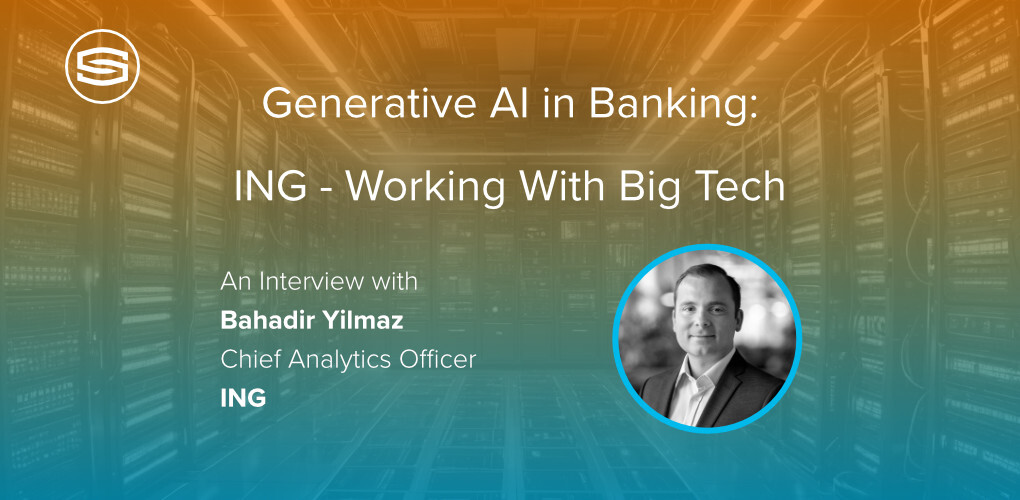
Insights & Opinions
Generative AI opportunities in Benelux Banking: ING - Working With Big Tech
Mon, 06 May 2024


Continuing my exploration of generative artificial intelligence (GenAI) use cases and opportunities in banking across the Benelux region, I had the opportunity to speak to Bahadir Yilmaz, Chief Analytics Officer at ING – the leading bank in the Benelux region in terms of total assets.
As this series of interviews progresses, there are clear, common areas of opportunity for banking executives to consider incorporating into their future strategy. What I have found interesting is that although there is a large degree of overlap in the applications of GenAI that the banks are experimenting with, (well, the areas they are allowed to talk to me about without disclosing competitive information), each one has its own individual take on them.
Experiments across 5 domains
Bahadir started by disclosing that they are currently experimenting in a very controlled and risk averse manner across 5 domains:
- Customer contact centres
- KYC
- Wholesale banking
- Software engineering
- Marketing content
When it comes to the customer contact side of things, moving beyond the common use cases of document summaries and an internal assistant for customer service agents, ING is also experimenting with a customer facing chatbot that will be able to assist customers directly. They already have a lot of experience working with NLP (natural language processing) and rules-based bots, but their current experiment involves using currently available public information published on their website, to power a GenAI chatbot to “talk” to the customer, for a more natural customer experience.
The mention of KYC (Know Your Customer) was a completely new and innovative application of GenAI that I wanted to dig deeper into. “Generative AI is highly aligned with the overall KYC operating model" Bahadir explained, "the capabilities that are provided by generative AI technologies coming up from big tech providers are able to reason much better compared to older versions.”
In the past, KYC relied on the availability of specific customer data, but the team is currently experimenting with GenAI to do an initial assessment based on a broader range of documents and policies. This enhanced reasoning capability allows for a nuanced analysis of customer data, potentially transforming risk assessment and compliance which Bahadir believes has promising potential over the next year or two.
In the realm of wholesale banking and lending, generative AI offers significant promise in streamlining complex, time-consuming loan processes. Bahadir shared that wholesale loan journeys are not as straightforward as in retail banking, often taking months of intensive manual tasks which can greatly benefit from AI-driven efficiencies.
“We are looking at different angles where generative AI might help. Firstly, from a risk exposure risk reduction perspective, and secondly, from a customer experience perspective. We think it can boost productivity, while fully maintaining a human in the loop. We can enhance our current operating model by applying these technologies that are made available by generative AI.”
By accelerating and refining risk assessment, generative AI can reduce processing times and enhance the overall customer journey.
We didn’t dwell on the use of GenAI in software engineering as this is already a well-documented and common use case amongst early adopters.
Marketing content is of course one of the easiest and lowest risk use cases to adopt right now and it’s a great way to get people more comfortable with the technology. We do this always with consent from the customer of course. So long as you’re not using any customer confidential or proprietary information, there is nothing stopping you from using ChatGPT or similar platforms to help your marketing department craft more compelling copy for social media posts and websites to resonate with your customers better.
Ethics and vendor platforms
A pivotal aspect of adopting generative AI involves addressing ethical concerns and regulatory compliance - areas that Bahadir strongly emphasised. As banks integrate more advanced AI technologies, the responsibility to manage biases and ensure ethical usage escalates. "We take ethics, especially model and data ethics very seriously" he asserted. “When it comes to machine learning models, we already have experience in evaluating certain elements , like bias and fairness, but also common standards across the market.”
ING's approach includes rigorous governance frameworks to evaluate AI applications for bias and fairness, ensuring that deployments are both ethical and compliant with stringent EU regulations, which extends to their evaluation of vendor platforms.
This last point is important because Bahadir shared that they have made a conscious, strategic decision to use 3rd party vendor platforms as much as possible without building their own in-house. “We think the big tech and the tech providers have a much more competitive advantage when it comes to offering better services, better platforms, and also better models going forward.” Their current focus therefore is not to compete with big tech, but rather to evaluate how they can securely use the existing solutions in a responsible and reliable way. This strategy not only mitigates the risks associated with rapid technological evolution but also ensures that the bank remains at the cutting edge of innovation without overextending its resources, which I believe is a very pragmatic approach.
Talent shortage
Despite the enthusiasm for AI increasing across the organisation, Bahadir acknowledges the current challenges, particularly in terms of talent acquisition. The scarcity of skilled professionals in AI and data science is a growing concern, as he points out that every single industry is currently looking at how they can leverage GenAI for competitive advantage. The competition for skilled professionals in AI is intense, and banks must innovate continually to attract and retain the best talents. To combat this, ING invests in extensive training programs and partnerships to cultivate an advanced data science workforce. Part of this involves providing all 65,000 ING employees “awareness training” which will highlight the opportunities, but also the (largely unknown as yet) risks associated with such a new technology.
Looking towards the future
As a trends researcher myself, I’m always curious to learn how other people and organisations keep on top of the rapidly evolving technology landscape. Bahadir answered my question with a joke:
“How do you know if there is an advancement in AI technology?
You don’t need to because they tell you!”
Yes, this certainly resonates with me as my social feeds are full of AI announcements on a daily basis! There really is no excuse for NOT knowing about the advancements in AI, but as Bahadir says, that’s not really the issue.
The biggest challenge is filtering through the noise and figuring out which advancements are applicable to you and which ones are merely interesting. Take for example the latest advancements in the Open AI Sora model which can create video from text. Is this of interest to a bank or not? Well, at first glance, it might not be, but it could be used positively for creating a lifelike video avatar of a customer service agent or it could be used against the bank for fraudulent purposes like impersonating a customer or employee …….
But looking towards the future, I referred to my earlier blog post on “The AI Bank Manager of The Future” and asked Bahadir if he thought this was science fiction or a real possibility for the future. He confirmed my thoughts as he believes that the next generation of customers will not only trust AI for impartial advice on their financial situation, they will indeed expect it.
The big question for me is “who” will consumer expect to get this advice from? Will banks be able to gain or maintain a sufficient level of trust, or will customers turn to third parties to find what they are looking for?
Conclusion
Bahadir’s insights provide a solid starting point for banking executives in the Benelux region considering the integration of generative AI into their operations. The strategic application of AI across marketing, customer service, KYC, wholesale banking, and software engineering presents numerous opportunities to enhance efficiency, improve customer satisfaction, and ensure compliance. However, the journey requires meticulous planning, ethical consideration, and proactive talent management.
As the landscape of financial services continues to evolve, generative AI stands as a beacon of potential, guiding the future of banking towards unprecedented innovation and success.
(In case you missed it, you can find the first article in the series here and you can download our white paper "Generative AI in Benelux Banking: Opportunities, Challenges and Future Outlook" for a consolidated collection of insights shared by Benelux bankers across 1:1 interviews, keynotes, panels and executive round tables we hosted)


